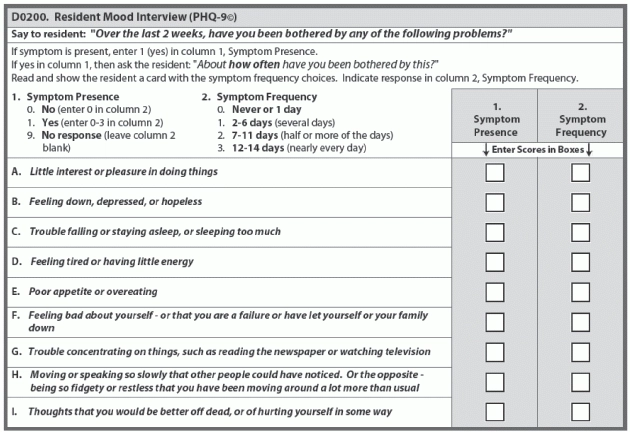Are You Conducting The Mood Interview The Right Way?
7 expert tips will help improve your interviewing techniques.
You can fall into a multitude of traps when performing D0200 — Resident Mood Interview (PHQ-9©), often because the questions are sometimes difficult for residents to understand, and no doubt because of the interview’s touchy subjects. Here are the most common pitfalls — and expert advice on how to avoid them.
Don’t Explain, Despite Confusion
When evaluating D0200A — Little interest or pleasure in doing things, “it is common for the resident to ask what we mean by this,” wrote MDS expert consultant Judy Wilhide-Brandt in a recent article for Washington, DC-based Leading Age. That’s not only because D0200A is the first question, but also because many people aren’t accustomed to being asked directly about their moods.
Mistake: But don’t be tempted to offer an explanation, even if the resident seems genuinely confused. You must read each question as it’s written, stressed Debra Saliba, MD, MPH, director of the UCLA/Jewish Home Borun Center for Gerontological Research, in a recent Centers for Medicare & Medicaid Services (CMS) instructional session.
When the Resident Has Different Answers
Beware that when you’re asking about D0200B — Feeling down, depressed, or hopeless, “these can be three very different feelings,” Brandt cautioned. “Remember to speak slowly,” and be prepared for a resident to answer, “Yes, I feel down and depressed, but not hopeless.”
Rule of thumb: Keep in mind that if the resident answers “yes” to any part of this item, you need to record the overall answer as “yes,” Brandt instructed. And then, you would record the highest frequency when the frequency varies within the item.
“For example, it is possible to have been bothered by feeling down almost every day, depressed more than half the days, and hopeless none at all,” Brandt explained. “This would be recorded as ‘yes — almost every day.’”
The same is true when the resident can’t decide between different frequency answers — you would select the higher frequency, Saliba said. And you do this because you’re not diagnosing, you’re screening.
“So it’s better to be over-vigilant in picking up something that may be problematic for the resident and coding it than to sort of underestimate the signs and symptoms that are going on,” Saliba explained.
Break Down Compound Items into Separate Questions
D0200C — Trouble falling or staying asleep, or sleeping too much: Because this item involves three different issues relating to sleep, you may need to avoid posing the question in a single shot. Instead, break down the question into smaller segments, pausing for an answer after each one, Brandt suggested.
Don’t Let Residents Steer You Off-Track
D0200E — Poor appetite or overeating “may bring up peripheral issues over the meal service in general,” Brandt cautioned. But don’t allow this to steer your interview off-track.
“It is important to acknowledge and press on with the interview,” Brandt stressed. Repeat the question if needed to get the resident to answer. “Remember to follow up later on any service concerns raised, but stay on course for the interview.”
Avoid Being Squeamish Over Touchy Questions
D0200F — Feeling bad about yourself — or that you are a failure or have let yourself or your family down can be an uncomfortable question for many people to ask, but it’s also extremely important, Brandt noted.
“If we can provide a safe, therapeutic space for these feelings to emerge, the resident can often work through them successfully,” Brandt pointed out. But the first step is acknowledging the feelings.
Practice Those Tough-to-Say Items
D0200H — Moving or speaking so slowly that other people could have noticed. Or the opposite — being so fidgety or restless that you have been moving around a lot more than usual: Because this item is so difficult and wordy, you need to work with this one a bit so that it won’t seem so unnatural, Brandt said. She offers three key tips: speak slower than usual, break it into segments, and practice.
Stay Neutral When Asking Suicide-Related Questions
D0200I — Thoughts that you would be better off dead, or of hurting yourself in some way is certainly a weighty question, but try not to place too much emotion or emphasis on your delivery of the question.
Try to pose this question just like you did for all the others, “with no more or less emphasis,” Brandt instructed. “Practice with other staff members.” And if you get a “yes” response, immediately follow up with the frequency question. Then, you can take any necessary steps pursuant to your facility’s protocol.
Remember: Also, don’t try to interpret what the resident is saying, Brandt cautioned. Instead, “ask for clarification if you believe you are getting mixed messages.”


